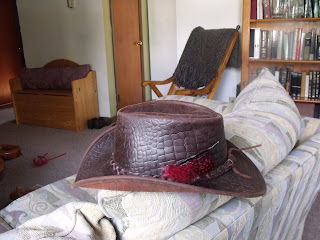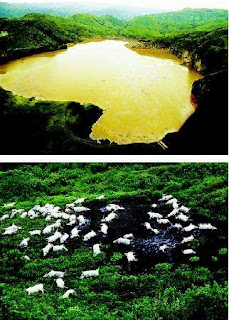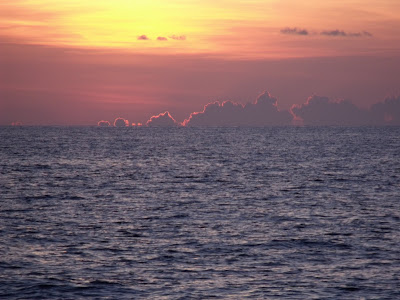 Eva loves food. Most people do, or at least the satisfaction that food provides.
Eva loves food. Most people do, or at least the satisfaction that food provides.One of my first jokes about Eva was that she had a big mouth and her plumbing worked with tremendous efficiency--no doubt she was a Sutherland.
Kate was already a lover of Italian food, and I've only confirmed and strengthened the obsession. Tomato sauce is the one thing I have the confidence to freely improvise with, and Kate's come to have quite a lot of skill herself. Carrots, fiddleheads, even apple shavings on occasion--just about anything (except hamburger! Tasteless bane of tomato sauce) can become an artful and tasty part of dinner. (There aren't many rules, aside from common-sense things like not being jerks to each other, that I ask Kate to abide by: three of those are, If she hears voices in her head, call me (a joke from an episode of House); make sure Eva gets her vitamin C and calcium supplements every day; and never, under any circumstances, add hamburger to tomato sauce. I think I'm pretty easy.)
So we love Italian food. That includes making (sort of) our own pizza--only "sort of" because we buy the pre-made, uncooked dough, and buy our sauce in a jar. But we do put everything together and cook it, so it's more homemade than order-out. Besides, Kate's gotten pretty good at spreading the dough. Not toss-it-in-the-air good (though she could if she wanted), but much better than I am at spreading it out evenly so there aren't holes or rips or thick spots. She hated doing it at first, when I kept on foisting it off on her, but she came to enjoy it, and now she's pretty kick-butt at it.
In the division of labor, that leaves me to chop up the toppings, commonly kibble-sized bits of pepperoni and tiny shards of garlic. Aside from finding (in lieu of actually making) the right dough with a touch of sweetness, we have a few important idiosyncrasies. First, the shape of the pepperoni. Big round slices are hard to eat, because sometimes you can't bite through the whole thing, and it pulls off a bunch of cheese with it. Start with your pepperoni stick, cut nice, thick slices (1/8 to 1/4 inch thick), and then cut those into sixths. Carefully spread the thick little pepperoni wedges around on the sauce, distributing them evenly. (Yes, this is a recipe for delicious pizza. No, this is not a technique for making pizzas quickly and for profit.) Second, use twice as much sauce as is normal on a pizza. It just adds to the savor. Third, the toppings go on the sauce, underneath the cheese. That way they don't char.
So we've got this technique, and Kate says we're going to be the cool house, where kids will want to come because we make great pizza. That sounds OK to me.
And it looks like we're off to a good start, because little Eva is taking after us quite nicely. She has a real and unmistakable fondness for Italian food, mainly pasta in tomato sauce and above all else (even including applesauce), pizza.
Little Eva even knows the difference between homemade sauce and Chef Boy-Ar-Dee. Two mouthfulls of the Chef and she's averting her head. If she can develop similar taste in music...
Anyhow, we've seen her worse and more ferocious instincts come out when we serve pizza. The first time was last summer, probably early or mid-June, before I left for Louisiana the first time. We'd made a few pizzas for ourselves, Ma and Dave, and all sat down at the table to eat. It's too bad I don't have pictures or video to demonstrate what I write: once Eva realized she was having pizza for dinner, she began roaring for more.

Meaning, slamming her palm on the table and screaming "Wraaaaaaaaaaaaa!" at the top of her lungs until we gave her another piece. It was like the first time I gave my cat shrimp, and he reacted by jumping and yelling at me and clawing my leg, only Eva was roughly 200 times as loud. There was no plaintiveness, no crying, no coyness or amusement. The little baby was all aggression, trying to get more in her mouth.
(There's no doubt that infants go through much of the range of human psychology--pretty much everything except the sexual sensations, I'd guess--within the first year or two. Just seeing the intensity--the whole-body-writhing, face-contorting intensity--of joy, fright, pain, peacefulness and rage, is kind of amazing. And of course, Kate blames Eva's temper on me.)
So anyhow, we realized we had a little tyrannosaur on our hands. Infants don't joke around, when it comes to something they need, but in a near-toddler (at that point--she wasn't even crawling yet), it was pretty surprising to see basic instinct rear itself up to near-violence. It became a bit of a joke between us, and I started referring to Eva occasionally as godzilla.
(I've been searching for a good nickname for our daughter, since my father came up with one of the very best I've ever heard of, for my elder sister Julie: J-bird. Even better than Bops' calling my mother "pud"--that's pronounced "pood", as in short for pudding, not as in "pudley" o r anything insulting like that. Anyway...)
r anything insulting like that. Anyway...)
 r anything insulting like that. Anyway...)
r anything insulting like that. Anyway...)Plainly godzilla would be a cruel and derisive nickname to give a girl. I might've deserved it as a small boy, but my mother's sense of humor was quite a bit gentler than mine is. In Eva's infancy, I called her "Rocky" because she slept with both her arms raised above her head, as if in triumph. But she stopped doing that so I figured it was time to let that one go. Sometimes I've called her Thumper, because of how she learned to crawl (from me) by slamming the floor with her hands, something she still does. That's a little better because there's a bunny rabbit in children's literature named Thumper, but still, it seems a little mean-spirited. It's not good to be too sarcastic with a child, I think, particularly in how you address her. Who knows, maybe things will turn out like in Dirty Dancing, and I'll just call her "Baby" until she's about 40. I have no idea.
So godzilla was mostly a memory, until Thursday night. Kate having mostly recovered from her mysterious maybe-Lyme disease, she ventured to have a small frozen pizza, while I made some pasta for myself. Things were a bit discombobulated, with Kate taking a late-afternoon nap and Eva threatening to blow up because she was hungry, so I gave the little girl her own dreadfully dull dinner while I began preparing my own meal (garlic and shrimp in tomato sauce--the key is to drain off the water from the shrimp so the sauce stays thick).
True to form, Eva ate quite a bit while I worked, and got things bubbling on the stove. She was done by the time Kate came to, entered the kitchen and got her pizza going. We thought we'd have a more relaxed dinner than usual, since Eva had already eaten and wouldn't need constant tending.
We sat down and she walked over to Kate, put her hands on Kate's leg and began crying. Only she refused mouthfuls of food when offered, turned her head away and began crying even more insistently. We put her back in her high chair and tried giving her a second dinner, with no more success, only a steadily worsening tantrum.
There are times I come close to losing my temper in return, when I see my child in discomfort and she resists my best efforts to help. I know getting angry in return won't accomplish a thing, but it's impossible to avoid the reaction. The little imp doesn't know what's good for her sometimes...
Kate and I were both worrying that this wasn't an ordinary tantrum. Kate herself might have been suffering from Lyme disease, and though it's not contagious, still, any vectors Kate was exposed to, Eva probably was too. What if the little baby was in constant; head-to-foot pain, and every motion was agony? What if she were in serious abdominal distress, and had no words to tell us with?
Kate took her temperature--twice--and confirmed there was no fever. What, then? Kate brought her back into the kitchen, and nearing her wits' end, placed the baby on her lap and gave her a whole piece of pizza to munch on.
Quiet. Blissful, immediate, profound quiet, as the thirteen-month-old girl wrapped both hands a round the wedge of pizza, sunk her teeth into it, and began suckling. And that's virtually what she did--take occasional bites, and chew them, but otherwise simply kept her mouth clamped on the pizza, held it firmly in both hands, and looked me straight in the eye with satisfaction and almost a hint of defiance.
round the wedge of pizza, sunk her teeth into it, and began suckling. And that's virtually what she did--take occasional bites, and chew them, but otherwise simply kept her mouth clamped on the pizza, held it firmly in both hands, and looked me straight in the eye with satisfaction and almost a hint of defiance.
 round the wedge of pizza, sunk her teeth into it, and began suckling. And that's virtually what she did--take occasional bites, and chew them, but otherwise simply kept her mouth clamped on the pizza, held it firmly in both hands, and looked me straight in the eye with satisfaction and almost a hint of defiance.
round the wedge of pizza, sunk her teeth into it, and began suckling. And that's virtually what she did--take occasional bites, and chew them, but otherwise simply kept her mouth clamped on the pizza, held it firmly in both hands, and looked me straight in the eye with satisfaction and almost a hint of defiance.For twenty minutes nothing changed, except that 3/4 of the piece of pizza disappeared, and Eva's drool was now dripping off the bottom of the crust onto her pants leg.
If Godzilla were to run into a mountain range made of baked ham, and settle down to eat it for a day or two, the effect would have been similar. The Sutherland house went from baby-induced pandemonium to bucolic in less than a moment.
Next night, more pizza, of course. Because it was Friday, and Friday means homemade pizza in our house (as Sunday means clean-out-the-leftovers). Only this time we were wise to it, and  devoted one whole piece (garlic included) to the baby, though we did cut it into smaller pieces (the crust being much fluffier than the frozen one the night before). We ate in front of the TV, watching Celtics preseason basketball (still too difficult to talk about last season), with their six top players on the bench and the subs nearly taking Philly down. (Philly's terrible, and even they know it.) And Eva was happy as she'd been earlier, laughing, smiling, babbling "da-da" and clucking her tongue like she does when she's happy.
devoted one whole piece (garlic included) to the baby, though we did cut it into smaller pieces (the crust being much fluffier than the frozen one the night before). We ate in front of the TV, watching Celtics preseason basketball (still too difficult to talk about last season), with their six top players on the bench and the subs nearly taking Philly down. (Philly's terrible, and even they know it.) And Eva was happy as she'd been earlier, laughing, smiling, babbling "da-da" and clucking her tongue like she does when she's happy.
 devoted one whole piece (garlic included) to the baby, though we did cut it into smaller pieces (the crust being much fluffier than the frozen one the night before). We ate in front of the TV, watching Celtics preseason basketball (still too difficult to talk about last season), with their six top players on the bench and the subs nearly taking Philly down. (Philly's terrible, and even they know it.) And Eva was happy as she'd been earlier, laughing, smiling, babbling "da-da" and clucking her tongue like she does when she's happy.
devoted one whole piece (garlic included) to the baby, though we did cut it into smaller pieces (the crust being much fluffier than the frozen one the night before). We ate in front of the TV, watching Celtics preseason basketball (still too difficult to talk about last season), with their six top players on the bench and the subs nearly taking Philly down. (Philly's terrible, and even they know it.) And Eva was happy as she'd been earlier, laughing, smiling, babbling "da-da" and clucking her tongue like she does when she's happy. And that's good. Because when she's not...




 ...three honky-tonk!
...three honky-tonk!




 I was too slow. She'd been laughing and clapping and jumping, watching the screen.
I was too slow. She'd been laughing and clapping and jumping, watching the screen.
















 The maxi pad.
The maxi pad. The tampon.
The tampon.




